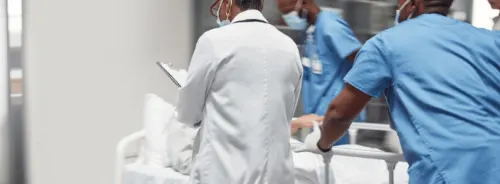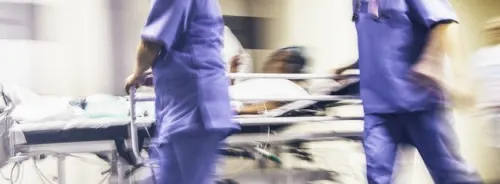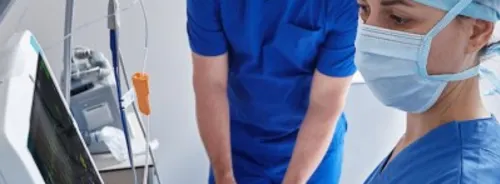ICU Management & Practice, ICU Volume 5 - Issue 1 - Spring 2005
Authors
European Society of Intensive Care Medicine
Rui Moreno, MD
Chairman of the Division of Scientific Affairs & Chairman of the Congress
Committee
Dermot Phelan FJFICM, FFARCSI
Chairman of the Division of Professional Development & Chairman of the Education and Training Committee
Website
Correspondence
Drs Moreno and Phelan review last year’s ESICM Congress in Berlin and provide a flavour of the September Congress in Amsterdam.
Last year, the 17th ESICM Annual Congress of the European Society of Intensive Care Medicine (ESICM) took place at the ICC (International Congress Centre) in Berlin (Germany) from the 10th to the 13th of October. The congress was highly successful, very well attended (4315 participants) and continued the process of change and development introduced two years ago in Amsterdam.
In a good mixture of science and education, more than 300 people started the Congress on Saturday attending five Post-Graduate courses (Acute circulatory failure, End-of-Life, ICU management & Organization, Infection, Mechanical ventilation) organized by the ESICM sections. An additional two courses are organized by the Committee of Education and Training in collaboration with the Society of Critical Care Medicine (SCCM): The Fundamentals of Critical Care Support Course (FCCS) for instructors and a Disaster Management course which incorporates the SCCM’s Fundamentals of Disaster Management (FDM) course for instructors. The full course has a special European flavour with experts with practical, “hands-on” experience of natural disasters and man-made catastrophes providing a reality feel to the course. This feature and the interactivity and the ‘teaching to teach’ dimension, to the FCCS course in particular, have been very well received.
Registrants from 74 countries (86% were medical doctors) confirms the sustained growth of interest in our Annual Congress. The traditional session formats (thematic sessions, round-tables, pro-con debates) were complemented by Competency based sessions (still completely full; although the room had been enlarged since 2003 it was still too small to accommodate all interested participants). The newly introduced daily sessions on “What I learned today” and “What I learned in the last two years” raised some interest, together with the sessions based on the new PACT Modules, which profiled newly published ‘Hot off the Press’ modules from the Society’s distant learning programme for Intensive Care Medicine - PACT. Many of these sessions will be repeated in Amsterdam with new modules and with slight changes to allow more comprehensive content exploration and interaction.
The Education Track is patently an important continuing education and pre-EDIC component to the Congress which attracted a loyal attendance among a cohort of senior and Intensive Care trainee congress registrants.Work is required to ensure that the topics are more consistently attractive and to endeavour to have the modern educational devices e.g. the interactivity and potential of the digivote system utilised to the optimum.
Last but not the least, the opening session included a lecture given by Professor Lambert Thijs about the congress motto: “Intensive Care: A Science and an Art”, that will certainly stay in the memory of all that took part in this unique moment. A summary of the lecture has been reproduced in a recent society newsletter.
This year, and for the third time since its creation, the European Society of Intensive Care Medicine (ESICM) will have the Annual Congress in the beautiful city of Amsterdam (The Netherlands) from the 25th to the28th of September, under the motto “Facing the challenge:
the ICU without walls”.
The meeting will start on Saturday with a Post-Graduate Course addressing the multiple challenges of establishing an ICU without walls e.g. multidisciplinary education and training, integrate clinical care. Also, other Post- Graduate courses will take place on Saturday and Sunday (FCCS, FDM, Neuro-intensive care, Non-invasive mechanical ventilation and Severe sepsis and septic shock).
During the Congress, around 200 speakers will fulfil 650 commitments in the programme, some organized as joint-ventures with other Societies (e.g. SCCM, ESA, ESPEN, ESCMID and ATS). Several formats will be available to meet the needs of all professional groups, with special emphasis on medical doctors, Nurses & other Allied Health Professionals.
Post-Graduate
Courses
• The Congress Committee is organising 6 post-graduate courses that will be held on the Saturday and/or the Sunday prior to the core congress programme.
·
Continuing Professionals
Development Sessions
• The ESICM Education and Training Committee has set up, with the collaboration of the Division of Scientific Affairs, a full educational track (11 sessions) throughout the congress. An interactive format (computer digivote system) will be available. An encouraging new education feature which was piloted successfully at Berlin, in conjunction with established leaders in the area of Clinical Simulation, was the application of Simulation to Intensive Care scenarios. This feature was enthusiastically received by those who became involved in these workshops. There is a future potential to incorporate the PACT clinical challenges into Simulation scenarios, the demonstration of which may well be a feature of future Congresses.
PACT Sessions
• These sessions are based on newly published or newly updated PACT modules. An attraction is that the speakers are PACT authors and audience participation has been a strong feature.
·
TheMatic Sessions
• Lectures by key experts and well-known speakers on related topics. These are State-of-the-Art lectures scheduled from 8.30 till 09.30 and from 16.00 till 18.00 each day.
• They include conferences, round-tables, pro-con debates.
Competency Training Sessions
• The ESICM Congress Committee organises for the second time 22 Competency training sessions. These sessions are 30-min training sessions on “How do I…?”. Speakers and chairpersons are outstanding experts in their field willing to share practical experience with physicians and nurses.
·
Patient Challenges Sessions
• Two key experts and well-known speakers interact based on a real clinical case. The case is progressively presented by the chairman and discussed by the speaker (with interaction with the audience). Competitive and alternative diagnostic and therapeutic options are discussed and evaluated.
·
Industry Sponsored Sessions
• Organized at lunch time by the industry, with two chairs (one from the company and the other from the ESICM).
Finally, we hope to have again more than 1000 abstracts presented as in Berlin. The presentation of these free abstracts, mostly during unopposed sessions, allows the interaction of young and senior intensivists from all over Europe and the world and continues to be for us a matter of joy and pride, helping the mixing of science with clinical challenges, helping to build what we called two years ago in this same city “The Scientific Basis of Intensive Care Medicine”. This material will be presented in two formats:
·
Oral Presentations
• These sessions include the Oral presentation of 6 successive abstracts. Each presenter is allowed a 10-min presentation followed by a 5-min time slot for comments and discussion by the audience and the chairpersons.
• The afternoon sessions include a 15-min introduction lecture by an expert in the field, which should give an overview of the current State-of-the-Art on a specific aspect of the topic related to the abstracts presented in the session; and a 5-min conclusion during which the speaker will discuss current or future issues in the field covered by the abstracts presented.
·
Poster Sessions
• These sessions include a viewing and discussion of the posters on a related topic, from 11.10 till 13.00, during which the presenting authors stand beside their posters. There are two chairpersons for each session.
The awards for the best oral presentations and/or posters will be delivered on a daily basis, together with and this is something new – a special award for the best material derived from the European Critical Care Research network. The abstracts produced by this cooperative effort of the ESICM will also have a special display area, near the ESICM booth and will be on display during all of the congress.
In conclusion, Amsterdam will be a fine blending of science and education, of young and old people, of professionals with very different backgrounds and working medicine in very different environments, but united by the same challenge: to deliver in a humane manner the best possible care to the appropriate patient in the right time. Analyses of registrants demonstrate, peculiarly that a majority of attendees are not ESICM members. We suggest to the entire ESICM membership, of over 3,000 persons, that the new, evolving, comprehensive format covering new Science and Continuing Education in Intensive Care is extremely attractive and is especially inviting to all (as is the fine wine at the opening ceremony!). Members additionally enjoy favourable registration rates and a greater presence of members would undoubtedly enhance the congress further and help all to find the whole European Congress experience especially useful and most enjoyable.
See you in Amsterdam.





